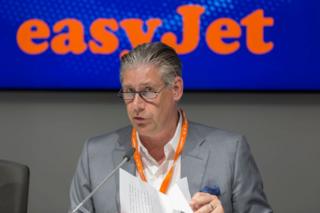EasyJet boss says full planes are 100% safe as flights resume
 Image copyright Getty Images
Image copyright Getty Images The boss of EasyJet has said he would feel «100% safe» flying on full planes as the airline resumed a limited number of flights after a 10-week hiatus.
Johan Lundgren told the PA news agency the airline had followed international guidelines to step up hygiene ahead of a resumption of services on Monday.
Passengers and crew will wear masks and planes will be deep-cleaned often.
But passengers will not have to sit 2m apart, despite calls for middle seats to remain empty for social distancing.
«That was a proposal early on from one of the regulators,» Mr Lundgren told the BBC’s Today programme.
«But the recommendations that have come out from international authorities… which are also supported by the different local regulators do not include social distancing measures on board the aircraft.»
The idea of keeping middle seats empty has been strongly criticised by some airlines, with Ryanair boss Michael O’Leary calling it «idiotic» and warning it would make commercial flights unviable.
But Easyjet said previously it would follow the practice to encourage more people to fly, and some Asian countries have made it a rule.
EasyJet has not flown passengers since late March after numerous countries brought in travel restrictions to fight coronavirus.
However, it is now flying to a limited number of mainly domestic destinations and will offer more routes from 1 July.
Mr Lundgren said the airline would offer about 300 flights this week, across 22 European airports. That is a fraction of the usual number, with the carrier having had to cancel around 47,000 flights in April after lockdown began.
He said not operating a single flight since March had been «devastating» and he was not expecting a swift return to normal demand, blaming the UK’s new quarantine rules.
These rules force travellers to the UK to isolate for 14 days – something the government argues is key to stopping a second wave of the virus in the UK.
But last week EasyJet, British Airways and Ryanair filed a formal legal challenge to the rules, arguing they would decimate the tourist industry and destroy thousands of jobs.
Mr Lungren told the BBC: «I don’t think people will travel to the same extent as if the quarantine was removed – we saw that in other countries where quarantines were put in place in the early phases of the crisis, there were hardly any bookings at all.»
Airlines have been hit hard by the pandemic as international travel has slowed to a trickle, prompting many to announce job cuts:
- EasyJet has said it will cut up to 30% of its workforce – about 4,500 jobs
- British Airways is proposing to make 12,000 of its 45,000 staff redundant, with more than 1,000 pilot roles at risk
- Ryanair is set to shed 3,000 jobs – 15% of its workforce – with boss Michael O’Leary saying the planned cuts are «the minimum that we need just to survive the next 12 months»
- Virgin Atlantic, which employs 10,000 people, has said it will cut 3,000 jobs
- Other European airlines cutting back include Germany’s Lufthansa, which on Thursday said it would cut 22,000 jobs.
However, gradually carriers hope to get back in the air as restrictions are eased.
EasyJet plans to reopen half of its 1,022 routes by the end of next month, increasing to 75% during August.
Ryanair intends to restore 40% of its flights from 1 July, while British Airways is due to make a «meaningful return» to service next month.


